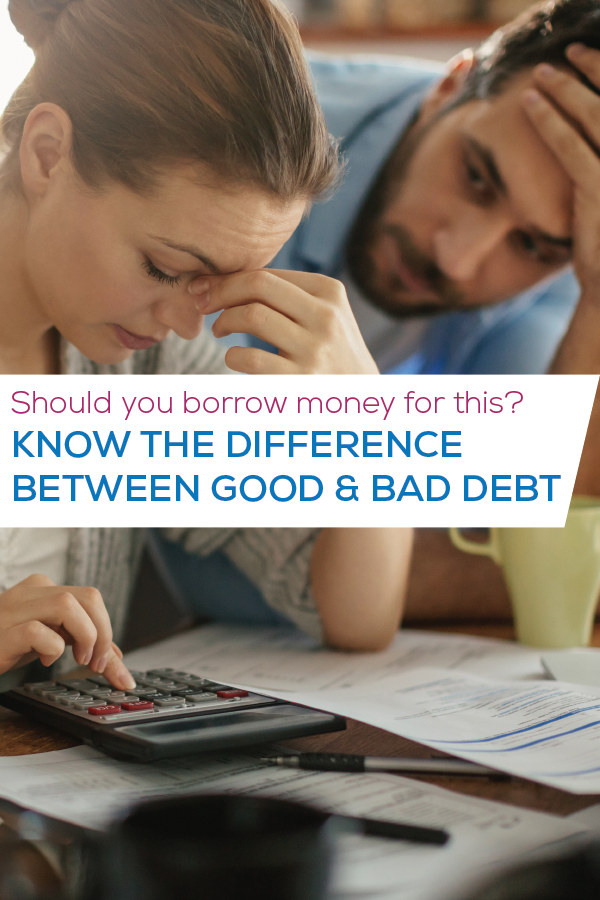Money Smarts Blog
Know the difference between good and bad debt
Feb 25, 2015 || Amanda Spurgeon

Most of us can’t afford to live entirely debt free, but not all debt is the same. While some types of debt can actually be beneficial, others can be dangerous. Before you borrow money, it’s good to know the difference between “good” debt and “bad” debt. In general, “good” debt will create value over time. “Good” debt is often tax deductible, and your purchase should appreciate, or produce more wealth. Any debt that you accrue for things that have no potential to increase in value is “bad” debt.
Mortgages
It’s not likely that you can afford to purchase a home in cash, but that doesn’t mean you shouldn’t own a home. If you plan carefully and only borrow what you can afford to pay back, a home can be an excellent example of “good” debt. Your purchase will likely appreciate, especially if you make any renovations or improvements to the property. Plus, any interest paid may be tax deductible, talk to your tax advisor for details.
Student Loans
People with college degrees or education in a skilled trade tend to make more money in a lifetime than those who stop at high school. An investment in a college degree or skilled-trade school is likely to pay for itself within the first few years after a student enters the work force. As with all debt, it’s important that you don’t borrow more than you really need or student loans can quickly become “bad” debt. Experts recommend borrowing no more than what you expect to make in the first year of employment after graduation.
Business Loans
In this case the saying “it takes money to make money” is certainly true. You need a little capital to begin a new business or expand an already successful one. However, business loans are only “good” debt if you borrow reasonably and have a clear plan to generate more business or income.
Credit Cards
Credit cards are often used to purchase wants rather than needs, and the ease of use can have debt piling up faster than we realize. If you’re purchasing things like clothing, food or vacations with a credit card and not paying off the balance in full each month, you’re looking at “bad” debt. You’re charged interest every time you make a partial payment. The items you purchased are likely continuing to lose value, but the price you paid for them keeps increasing. Beware of credit card gimmicks that lure you in with introductory rates that will likely skyrocket later.
Car loans
While you probably need a car to get to work and run all of life’s other errands, you don’t have to go broke to get one. Most new cars depreciate quickly, sometimes as much as 20% in the first year. If you buy more car than you can afford, you may end up with a loan balance higher than what your car is actually worth. If you take out a loan, think about purchasing a pre-owned car. Look for a loan with a competitive interest rate and consider paying an extra $25-50 per month so you can pay it off more quickly.
Are you struggling with some bad debt? IH Mississippi Valley Credit Union offers smart student loans, competitive auto and mortgage rates, and gimmick-free credit cards to help keep you on the right track. Visit us at any branch today! We’re here to help.

Know the difference between good and bad debt
Feb 25, 2015 || Amanda Spurgeon

Most of us can’t afford to live entirely debt free, but not all debt is the same. While some types of debt can actually be beneficial, others can be dangerous. Before you borrow money, it’s good to know the difference between “good” debt and “bad” debt. In general, “good” debt will create value over time. “Good” debt is often tax deductible, and your purchase should appreciate, or produce more wealth. Any debt that you accrue for things that have no potential to increase in value is “bad” debt.
Mortgages
It’s not likely that you can afford to purchase a home in cash, but that doesn’t mean you shouldn’t own a home. If you plan carefully and only borrow what you can afford to pay back, a home can be an excellent example of “good” debt. Your purchase will likely appreciate, especially if you make any renovations or improvements to the property. Plus, any interest paid may be tax deductible, talk to your tax advisor for details.
Student Loans
People with college degrees or education in a skilled trade tend to make more money in a lifetime than those who stop at high school. An investment in a college degree or skilled-trade school is likely to pay for itself within the first few years after a student enters the work force. As with all debt, it’s important that you don’t borrow more than you really need or student loans can quickly become “bad” debt. Experts recommend borrowing no more than what you expect to make in the first year of employment after graduation.
Business Loans
In this case the saying “it takes money to make money” is certainly true. You need a little capital to begin a new business or expand an already successful one. However, business loans are only “good” debt if you borrow reasonably and have a clear plan to generate more business or income.
Credit Cards
Credit cards are often used to purchase wants rather than needs, and the ease of use can have debt piling up faster than we realize. If you’re purchasing things like clothing, food or vacations with a credit card and not paying off the balance in full each month, you’re looking at “bad” debt. You’re charged interest every time you make a partial payment. The items you purchased are likely continuing to lose value, but the price you paid for them keeps increasing. Beware of credit card gimmicks that lure you in with introductory rates that will likely skyrocket later.
Car loans
While you probably need a car to get to work and run all of life’s other errands, you don’t have to go broke to get one. Most new cars depreciate quickly, sometimes as much as 20% in the first year. If you buy more car than you can afford, you may end up with a loan balance higher than what your car is actually worth. If you take out a loan, think about purchasing a pre-owned car. Look for a loan with a competitive interest rate and consider paying an extra $25-50 per month so you can pay it off more quickly.
Are you struggling with some bad debt? IH Mississippi Valley Credit Union offers smart student loans, competitive auto and mortgage rates, and gimmick-free credit cards to help keep you on the right track. Visit us at any branch today! We’re here to help.
